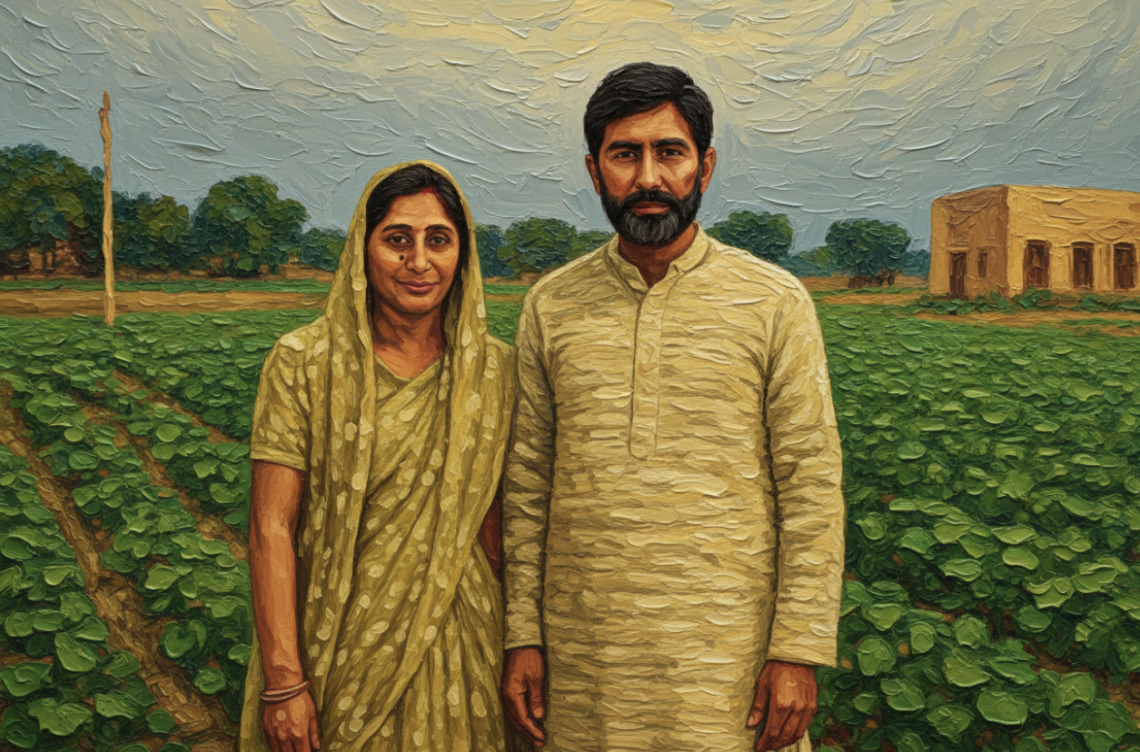Make your 2X MATCHED gift today!
This week only: Every $1 will be matched with $2 to enable women worldwide.
This week only: Every $1 will be matched with $2 to enable women worldwide.
Posted on 11/12/2025

Over 12 months, we interviewed 30 couples to better understand the challenges facing smallholder farmers today. This is the second in a series of blogs based on those interviews. Names and faces have been changed to protect privacy. Photo has been AI generated.
Kaira, 23, is a well-educated young mother who is frustrated by the inability of women to expand their contributions to the family outside the home. “First of all, my husband will not allow me,” she explains. “In villages, people are very skeptical about women going out, people will say ‘first take care of your kids.’” Kaira says with resignation. “We (women) should definitely earn, but they won’t allow it.”
According to Kaira, "Nowadays both males and females are at par. If (women) are capable of something, they should do it.” She continues, “It is a good thing; we must go out. And if (women) have interest in a particular thing, they should do it.”
Her husband Krish, 30, agrees with her in theory. “Yes, of course the opinion should change,” he says with conviction. “Here in our community females do not go out to work, but if they do then it is a good thing. Nowadays, females get opportunities in all the fields; they are ahead in all the fields so whatever they feel like doing, they do.”
Krish’s progressive answers about women working are complicated by his view of declining social values. When asked if women and men were better off in the past, Krish concludes, “Women were better before.” He goes on, “They managed the whole family and were more resilient. Men used to work outside while women handled everything at home. Compared to earlier times, women today have declined.”
The reality is, whether her husband would support her or not, taking care of a young child and the home - including help with harvest and other farm responsibilities - is a full-time occupation that leaves little opportunity for Kaira to pursue other income-producing employment. “I don’t want to combine household chores with caring for the child, but there’s no one else at home to help.” Kaira, who is pregnant with her second child and suffering from anemia, struggles even to prioritize her own health. “It’s difficult to take time off work to get the medicine,” she says.
One place where Kaira feels respected outside the home is at her local FPO meetings, which she is able to attend occasionally. “I have never felt treated as lesser because I am a woman,” she explains, “Whatever I say they listen to it and understand it. I say whatever I want to say.” Kaira continues confidently, “Yes, people support what I say. I have not seen them distinguishing between a man and a woman. They treat both of them equally. The way men are allowed to sit or say, women are also treated in the same way.” She is pushing for the FPO to provide farmers with more seeds, and machines to spread fertilizer; both of which she believes would improve the outcomes for small-scale farmers.
Their own farm produces wheat, mustard and rice, which they keep for their own use and sell the surplus to pay off debts. The bulk of their income comes from an ice cream business and a gym, which Krish and his brothers manage, relying heavily on his older brother who lives in Punjab and sends money to support the family. “During (lean times) we think in advance about the type of work we should do based on the season and its demands, and we adjust our work accordingly,” Kaira explains.
“Sometimes I take advice from my wife, Krish says, when asked who is the decision-maker when it comes to the family farm. “I take the decisions myself, I just ask for her opinion.” Kaira, who agrees that the responsibility for the farm falls on Krish, says she does not wish to be more involved in specifics, “No, nothing like that,” she says, “whatever he decides is final, I don’t know much about it.”
Days are long - Krish works the farm early in the morning and late in the evening to avoid the heat of the day, covering his head with a cloth when needed to stay cool. Kaira says she rarely goes out in the summer because of the heat; “If we ever go out, we wear a scarf on our head,” she says, adding that they recently installed a cooler in the house so it is more comfortable.
Despite the challenges of heat, uncertain harvests, constant work, limiting gender roles, and occasional lack of family support, when asked if they feel hopeful for the future, they both answered “yes.” Kaira stays optimistic and says she truly enjoys her life. “I feel good. It's good to be a farmer; I am proud of it. 100 out of 100 percent.”